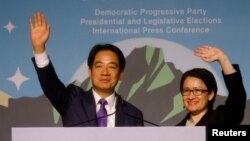Taiwanese Vice President-elect Hsiao Bi-khim wrapped up a whirlwind diplomatic tour to Europe last week, triggering Beijing as she made stops in three countries and Brussels and met with dozens of politicians.
Analysts and some who attended the meetings say the trip was an example of the type of high-level engagement Hsiao wants to continue after being officially sworn into office in May along with President-elect Lai Ching-te.
Hsiao met with parliamentary leaders in the Czech Republic, Poland and Lithuania. She also engaged with more than 30 lawmakers in the European Parliament in Brussels, including European Parliament First Vice President Othmar Karas.
According to Taiwan's Foreign Ministry, Hsiao emphasized Taipei’s “democratic alliance with European countries.” She also urged the European Union to sign an economic partnership agreement with Taiwan to “demonstrate its commitment to upholding regional prosperity.”
The ministry said her trip would help the EU understand Taiwan’s commitment to “maintaining peace and stability in the Taiwan Straits,” as well as expanding bilateral cooperation in various fields.
Some who attended events with Hsiao said she also reiterated Taipei’s commitment to support Ukraine, which is a priority on many Central and Eastern European countries’ agenda.
Introducing herself
The meeting in Prague “was an opportunity for Hsiao to introduce herself to Czech politicians,” Jakub Janda, director of the Prague-based European Values Center for Security Policy, told VOA by phone.
Janda said he attended a reception organized by Czech Senate President Milos Vystrcil, where Hsiao spent about an hour and a half “meeting the politicians one by one.” “Her trip shows that the incoming Taiwanese government wants to maintain high-level engagement with Central and Eastern European countries,” he said.
In Lithuania, Hsiao held meetings with members of different political parties, including the two candidates in the upcoming presidential election, and delivered a speech at the Lithuanian Vilnius University Institute of International Relations and Political Science.
Lithuanian national security expert Marius Laurinavičius, who attended a closed-door meeting with Hsiao, said that her meetings with Lithuania’s ruling bloc and one of the opposition parties suggests some opposition parties may have adjusted their views on the Baltic state’s relationship with Taiwan.
“Hsiao’s visit is a good sign for both countries because it shows some political parties may have changed their positions on Lithuania’s cooperation with Taiwan,” he told VOA in a phone interview.
In Brussels, some European lawmakers think Hsiao’s trip helped raise awareness about Taiwan in Europe before the European Parliament election.
“According to current election polls, the European Parliament will have a significantly larger right-wing camp in the new mandate; unfortunately, there is a tendency in that camp to be less China-critical,” Engin Eroglu, a member of the European Parliament who met Hsiao in Brussels, told VOA in a written response.
He said Hsiao’s presence in Brussels could help remind European lawmakers about the threats Taiwan faces and the huge impact a potential Chinese invasion of the island could have on global trade.
Hsiao’s European tour comes less than two months before the new administration, under the pro-sovereignty Democratic Progressive Party, comes into power. China has long opposed official interactions between Taiwan and other countries.
In response to her trip to the Czech Republic, the Chinese Foreign Ministry urged Prague to “take effective measures to undo the negative influence of the incident” and “strictly restrain certain politicians.”
Reinforcing ties with Europe
Some analysts say that Hsiao’s trip signals to countries in the region that Europe will remain important for Taiwan under the new administration.
“This visit corresponds to Taiwan’s overall effort to reinforce ties with Europe in recent years,” Zsuzsa Anna Ferenczy, an expert on EU-Taiwan relations at the National Dong Hwa University in Taiwan, told VOA by phone, adding that the countries Hsiao visited are those that have been more assertive about standing with Taiwan in recent years.
Since 2021, Taiwan has deepened its engagement with Central and Eastern European countries and the Baltic states by opening a new representative office in Vilnius, launching an investment fund worth $82.58 billion for Central and Eastern Europe, and signing agreements to deepen economic and cultural exchanges.
Building a role in the administration
In addition to continuing the foreign policy agenda established by the current administration, some experts say, Hsiao is using the European tour to “lay the groundwork” for her role in the new administration.
Lev Nachman, a political scientist at National Chengchi University in Taiwan, said it appears that Hsiao is looking to continue to grow Taiwan’s influence internationally much like she did when she was Taiwan’s de facto ambassador in the United States.
“Hsiao’s got more political and social capital internationally than other Taiwanese politicians, so I think the trip is a matter of her and the incoming administration wanting to make sure that this capital doesn’t go to waste,” Nachman said in a phone interview.
Meanwhile, Taiwan’s former President Ma Ying-jeou from the China-friendly Kuomintang is preparing for a trip to China next month. During that trip, Ma is widely expected to meet with Chinese leader Xi Jinping in Beijing.
Nachman said Hsiao’s European tour reflects the differences in Taiwan’s two main political parties’ foreign policy agenda.
“These trips further show the DPP’s approach of diversifying Taiwan’s external relations while the KMT favors the approach of rapprochement with the PRC,” he said.




